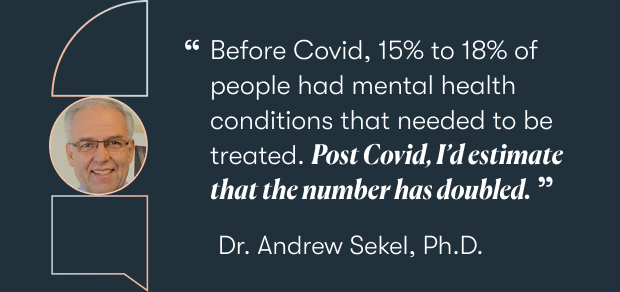
Covid-19's greatest impact may not be the disease itself. The emerging tsunami of mental health problems may end up having a greater long-term impact than the virus itself.
In this article we highlight an excerpt from an audio interview between Twill's SVP of Healthcare Strategies, Brendon Kelly, and Twill's Board Chairman, Dr. Andy Sekel, Ph.D., who is also the Managing Partner at Marketplace Funds.
In this excerpt, Dr. Sekel talks about the long-term mental health impact of Covid, and how mental health care will need to change in order to address it.
The complete interview with Dr. Sekel is available online, here.
Below is an Excerpt of the full interview transcript
|
Brendon Kelly: So, I have one final question and probably the most important for a lot of folks listening. If you were to leave us with one piece of advice, and I know that's asking a lot, for tackling the current mental health epidemic, what would that be? Dr. Andy Sekel, Ph.D.: I think we just have to really work hard to increase access. And by access, I mean all sorts of access: access to in-person interventions; to video interventions; to text interventions; to software. And we have to continue to work and understand those interventions and where they're the most appropriate. When I was looking at data years ago at the health plan and we saw 16, 18% of the people had mental health conditions that needed to be treated, I can't imagine what that number is post COVID. I mean, that's the number of losses that people have had. Both in people that they were close to. And also, in terms of just not being able to see individuals and all the losses that are well-documented, I can't imagine what the mental health level of concern is. I would guess it's way high into the twenties, in the low thirties. And then when I think about especially adolescents and children who've been isolated from social contact. We have a serious mental health problem. That's going to come across in a big way. As soon as COVID gets more and more reduced, and I don't think we're prepared. So, my comment is we have to work like crazy to get prepared and we have to rely on all the different capabilities that we have and we have to integrate them. In a way that makes sense. And not just by one more point solution after another, and then hope that somehow it all kind of works out. We have to be thoughtful and we have to work on platforms and we have to integrate and we have to make sure they work effectively. But most importantly, we have to have access and we have to have engagement. |
If you found this interview to be enlightening, we encourage you to join us for an extended conversation with Dr. Sekel on June 30.
Dr. Sekel will be hosting a webinar at 2pm E.T. that features three thought leaders in healthcare: Mike Thompson, President & CEO of the National Alliance of Healthcare Purchaser Coalitions; Steve Blumenfield, Head of Strategy and Innovation, Health & Benefits NA, for Willis Towers Watson; and Dr. Stuart Lustig, National Medical Executive for Cigna Behavioral Health.
We hope you'll join us.
You May Also Like:
- Dr. Andrew Sekel's Editorial: A Digital First vs. Digitally Enhanced Approach to Behavioral Health
- The complete audio interview with Dr. Sekel: Where Mental Health Still Misses the Mark
- Download Our Guide: How (and Why) to Implement Digital First Behavioral Health Solutions

